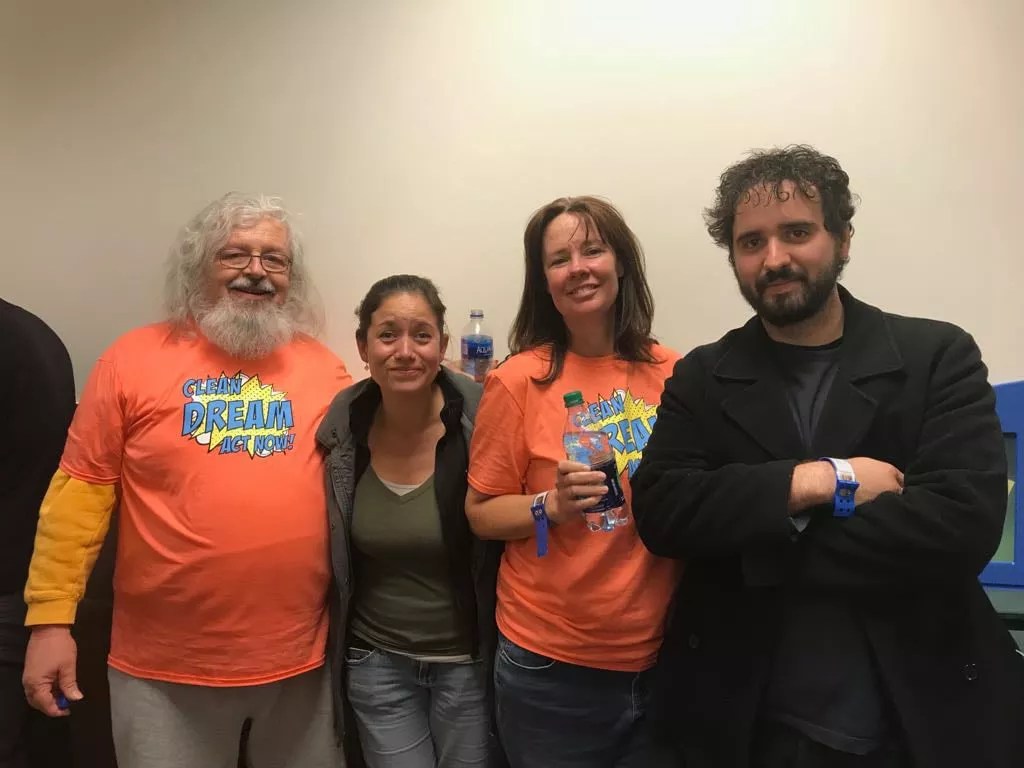
Courtesy of Bud Conlin

Audio By Carbonatix
Bud Conlin, a heavily bearded former high-school principal with a grandfatherly demeanor, has been showing up at the Krome Processing Center, an immigrant-detention facility in Miami, once a week since 2014. He’s the co-coordinator of Friends of Miami-Dade Detainees, a nonprofit that visits people at the Immigration and Customs Enforcement detention center, buys them books, and puts money on their phone cards. He tries to help people in what he calls “immigrant prison” feel like they’re still human beings.
But last Friday, Conlin says, he showed up for a regular meeting at 6 p.m., handed a security guard his ID, and was told not to come back.
“I recognized the guard, he took my license, but then he came back puzzled and said, ‘I’m told you can’t come in here anymore,'” Conlin tells New Times. “I said, ‘I’ve been coming here almost five years.'”
When he asked the guard, working for a private security contractor, why he’d been banned, Conlin says the guard replied, “I don’t know. ICE says you can’t.”
The guard then added that an activist Conlin works with, the Florida Immigrant Coalition’s Tomas Kennedy, “is banned as well.” Conlin says he demanded to know what had changed, but after a security guard contacted an unnamed “supervisor” via phone, the guards still refused to let him inside.
Conlin and Kennedy say ICE has still not explained why the two have been barred from helping detainees at Krome. But both activists say they assume the ban followed a July protest where they were arrested outside the ICE facility in Miramar. The charges in those cases are pending.
After this story was initially published an ICE spokesperson released the following statement to New Times, which does not deny that the two men have been banned from Krome:
ICE’s 2011 Performance Based National Detention Standards dictate visitation procedures at detention facilities. Detainees in ICE custody can maintain morale and ties through visitation with their families, the community, legal representatives and consular officials, within the constraints of the safety, security and good order of the facility. If the facility administrator believes that the safety, security or good order of a detention facility may be compromised, ICE can deny an individual access to a facility.
But both men have been arrested for acts of civil disobedience before. Kennedy, arguably the busiest immigrant-rights activist in Miami, has been arrested twice during protests Washington, D.C., over the past 12 months. But even with those arrests on their records, Conlin and Kennedy say they were still allowed inside the detention center to help detainees.
Both men suggest the July protest – in which Conlin, Kennedy, and 15 other activists were arrested outside the Miramar ICE headquarters after they refused to get out of the street – simply put too much heat on the agency’s actions in Miami. Conlin says he sat outside the oft-protested Miramar facility from noon till 6 p.m. July 18 before being taken to jail.
“It was right after the Miramar event; that’s when they implemented this ‘policy,'” Kennedy says. “All we do when we go into Krome is try to connect to people in a human way. We don’t want people to feel like they’re alone, like they’re a person indefinitely forgotten or that they’re just sitting in detention facilities because it makes money for government contractors.”
As far as Conlin knows, he and Kennedy are the only two activists tied to the Miramar protest who’ve been banned from ICE facilities.
Nationally, ICE has been accused of retaliating against immigrant-rights activists. Multiple activists, including New York’s Ravi Ragbir and Jean Montrevil, Wisconsin’s Ricard Fierro, and Arizona’s Alejandra Pablos, were detained within the past 12 months. All four say they were detained because of their activism. An immigrant journalist, Tennessee-based Manuel Duran, told the Daily Beast this year that he “without a doubt” feels like ICE arrested him as retaliation for writing negative stories about the agency.
Earlier this year, Kennedy’s mother, fellow activist Maria Asuncion Bilbao, videotaped a security guard outside the Miramar ICE headquarters threatening to arrest her for recording on the Miramar property.
Proud to be one of seventeen people who were arrested yesterday for shutting down an ICE facility in Miramar where people are screened and processed for deportation. Trump’s deportation machine has to be stopped. Another world is possible. #AbolishICE pic.twitter.com/8sueosCmlw
— Tomas Kennedy (@tomaskenn) July 19, 2018
Given that they’d been allowed for years inside Krome, both activists say they believe ICE is trying to make an example out of them to discourage immigrant-rights protests. The activists say the ban is a violation of the First Amendment.
Both men say they’ve done nothing otherwise that would warrant a ban from any ICE facilities. Conlin visits Krome more often than Kennedy visits – Conlin says that roughly once per week since 2014, he has checked into the facility 45 minutes early, passed through security, and spoken by phone to detained immigrants through Plexiglas. He tells them he’s there as a “friend” to let the detainees know they aren’t trapped alone in the churning wheels of the U.S. deportation machine.
“I tell them we come here to let you know that we don’t want anyone in immigrant prison,” Conlin says. “I tell them we’re not lawyers and we’re not religious. We’re there to make sure they’re treated all right.”
Conlin says he and Kennedy now plan to huddle with lawyers and other activists to debate whether to take
“It was a very empowering experience, being in a large crowd out there,” Conlin says. “We took over the street. I’m glad I did it.”